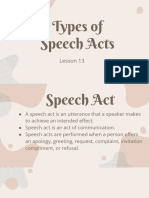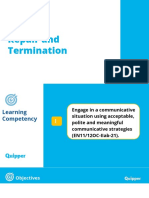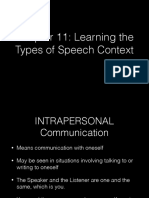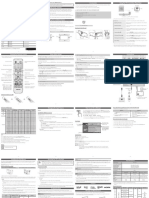100%(1)100% found this document useful (1 vote)
675 viewsFunctions of Communication
Functions of Communication
Uploaded by
Gil forobleThe document summarizes the 5 major functions of communication:
1. Regulation/Control - Communication controls behavior through authority hierarchies, guidelines, and informal communication.
2. Motivation - Communication motivates employees by clarifying goals, providing feedback, and reinforcing behavior.
3. Emotional Expression - Communication allows employees to express frustrations and satisfaction within their work group.
4. Information - Communication facilitates decision making by providing needed information.
5. Social Interaction - Communication involves interacting and sharing attention with others rather than just controlling behavior. It includes greetings, requests, comments, and answering questions.
Copyright:
© All Rights Reserved
Available Formats
Download as PPTX, PDF, TXT or read online from Scribd
Functions of Communication
Functions of Communication
Uploaded by
Gil foroble100%(1)100% found this document useful (1 vote)
675 views12 pagesThe document summarizes the 5 major functions of communication:
1. Regulation/Control - Communication controls behavior through authority hierarchies, guidelines, and informal communication.
2. Motivation - Communication motivates employees by clarifying goals, providing feedback, and reinforcing behavior.
3. Emotional Expression - Communication allows employees to express frustrations and satisfaction within their work group.
4. Information - Communication facilitates decision making by providing needed information.
5. Social Interaction - Communication involves interacting and sharing attention with others rather than just controlling behavior. It includes greetings, requests, comments, and answering questions.
Original Title
FUNCTIONS OF COMMUNICATION.pptx
Copyright
© © All Rights Reserved
Available Formats
PPTX, PDF, TXT or read online from Scribd
Share this document
Did you find this document useful?
Is this content inappropriate?
The document summarizes the 5 major functions of communication:
1. Regulation/Control - Communication controls behavior through authority hierarchies, guidelines, and informal communication.
2. Motivation - Communication motivates employees by clarifying goals, providing feedback, and reinforcing behavior.
3. Emotional Expression - Communication allows employees to express frustrations and satisfaction within their work group.
4. Information - Communication facilitates decision making by providing needed information.
5. Social Interaction - Communication involves interacting and sharing attention with others rather than just controlling behavior. It includes greetings, requests, comments, and answering questions.
Copyright:
© All Rights Reserved
Available Formats
Download as PPTX, PDF, TXT or read online from Scribd
Download as pptx, pdf, or txt
100%(1)100% found this document useful (1 vote)
675 views12 pagesFunctions of Communication
Functions of Communication
Uploaded by
Gil forobleThe document summarizes the 5 major functions of communication:
1. Regulation/Control - Communication controls behavior through authority hierarchies, guidelines, and informal communication.
2. Motivation - Communication motivates employees by clarifying goals, providing feedback, and reinforcing behavior.
3. Emotional Expression - Communication allows employees to express frustrations and satisfaction within their work group.
4. Information - Communication facilitates decision making by providing needed information.
5. Social Interaction - Communication involves interacting and sharing attention with others rather than just controlling behavior. It includes greetings, requests, comments, and answering questions.
Copyright:
© All Rights Reserved
Available Formats
Download as PPTX, PDF, TXT or read online from Scribd
Download as pptx, pdf, or txt
You are on page 1of 12
Functions of Communication
5 Major Functions of Communication
A. Regulation/Control. Communication controls member behavior in several ways.
Employees are required to follow authority hierarchies and formal guidelines.
Informal communication also controls behavior.
Example: (Explain why these examples fall under Regulation / Control)
1.When a boss tells his employees, “Please submit your reports before the deadline or else…”
2.When the teacher looks sharply at noisy students.
3.When an important document is not accepted because it was not signed by the principal.
B. Motivation. Communication fosters
motivation by clarifying for employees what is
to be done, how well they are doing, and what
can be done to improve performance.
1. The formation of specific goals, feedback on
progress toward the goals, and reinforcement of
desired behavior all stimulate motivation and
require communication.
2. Examples of Motivating Words are:
C. Emotional Expression. For many employees,
their work group is a primary source for social
interaction.
1. Communication within the group is a
fundamental mechanism by which members
show their frustrations and feelings of
satisfaction.
2. Communication provides an avenue for
expression of emotions and fulfillment of social
needs.
The Silent Majority
Close Groups
Elmer Zita
P'NOY - THE BEST PRESIDENT
Despite being maligned, you're the greatest President, worth remembering for. P'noy is being
cursed so much... Forgive them by cursing the man who brought a lot of honor & blessing for this
Country!
4K Wilma Amliw, Binalohawid TD and 4K others
54 shares
Comments 53 of 261 View previous comments
Sally De Luna Tesoro Thank you Mr President Noy your the best & the true STATEMAN.. We love
you & God Bless & keep you always!
Zenaida Aldover Yes,he s the best president our country has ever had,for me n the filipinos who
love him n democracy!i salute u my pres,may the good LORD bless u,protect u from.harm,give u
good health,peace,contentment n someone whom.u wud spend the rest of ur life!
Barry Atienza An honest President..dangal ng lahi
Ahmad Jun OmbajenEvangelista Dominice The best....
Jo Guevara Davis Agree! #PnoyPaRin� ��� ����������
� � � �
Neriza Besagas Thank you PNoy .. You make us proud, the best president we ever had.
Shakira Carrie Lottie Proud of u pres. Noy ur the best pres. We have
Loudie Olaybal Thank you for everything President Aquino! Godspeed!
Rico Andalis Lagatic Mabalos po saimo presedente pinoy ta dawa po nadaog si Sir Mar yaon pa
man si Ma'am Leni Robredo sigurado na mapadagos kan maray na ginibohan mo sa satuya
FREEDOM WALL FREEDOM WALL
D.Information. The final function that
communication performs is related to
its role in facilitating decision making
and that it provides the needed
information.
Ifugao Rice Terraces may become Urban Jungle
MAYOYAO, Ifugao—It’s fiesta time in the famed rice terraces of northern Luzon, and
young men in colorful tribal clothing pound ancient rhythms on brass gongs as wild
boars squeal ahead of slaughter.
The annual festivals, held in remote mountain communities after the planting of rice that
is at the core of their existence, are a vital way of passing centuries-old customs to the
new generation.
Those traditions are the soul of the Cordillera ranges, one of the Philippines’ most
spectacular regions where the Ifugao people are custodians of World Heritage-listed rice
terraces.
But the stepped paddy fields, built 2,000 years ago and the highest in Asia, as well as
the Ifugao’s traditional lifestyles, are facing unprecedented threats amid the relentless
forces of modernity.
“There is a danger of these beautiful areas turning into urban jungles,” Edison Molanida,
World Heritage sites manager for the National Commission for Culture and the Arts, told
Agence France-Presse.
“One of the main threats is the rapid pace of development in the area. And by rapid
pace, we mean unmanaged development,” Molanida said.
In conferring World Heritage status on the rice terraces, the UN Educational,
Scientific and Cultural Organization (Unesco) describes the region as “a living cultural
landscape of unparalleled beauty.”
E. Social Interaction. The communicator
is not acting solely to meet his own
needs. There is a social aspect and an
interactive component rather than a
controlling component. In here, the
communicator shares attention with
others.
Purpose Example of Social Interaction
Calling Says, “Sir” to get his attention.
Greeting Says, “Hi” or waves to a co-worker
Requests
interaction/interactive Pinch a co-worker who is snoring during a seminar.
activity
Comment/statement Says, “Nice” to a co-worker as he touches his suit.
Says, “Sir Mario, where is your report” when directly talking to
Naming
somebody.
If a co-worker tells the boss, “Monica is sick and can`t come to
Provides information/report
work” so the boss would know what to do.
Agree Gives positive head shake when asked if he likes the suggestion.
Express feelings Says “Congratulations” to a co-worker who got promoted.
Social routines Says “Thank you” when given an approval to a proposal.
Points in a direction when the boss asks, “Where is the
Answers question
document?”
Assertiveness Says “Mine” when somebody attempts to copy his idea.
Says “Uh-oh.” or “Oh, no!” to his teacher when he drops his
Exclamation
pencil for the 10th time.
You might also like
- Stevens, James - Digital Vernacular (2015)Document314 pagesStevens, James - Digital Vernacular (2015)BododNo ratings yet
- Border Collie Training GuidelinesDocument12 pagesBorder Collie Training GuidelinespsmanasseNo ratings yet
- Lesson 13 Types of Speech ActsDocument14 pagesLesson 13 Types of Speech ActsRhaven GonzalesNo ratings yet
- Purposive Comminucation Chapters 1 5 1Document67 pagesPurposive Comminucation Chapters 1 5 1Dummy AccountNo ratings yet
- 1-Writing A Close Analysis and Critical Interpretation ofDocument33 pages1-Writing A Close Analysis and Critical Interpretation ofJuzzley Casiño BalanNo ratings yet
- EAPP - SummarizingDocument42 pagesEAPP - SummarizingELOISA CANATA100% (1)
- Module 3 Creative WritingDocument13 pagesModule 3 Creative WritingMione AlmeydaNo ratings yet
- Oral Com - Speech ActsDocument32 pagesOral Com - Speech ActsAnne Cris AzorNo ratings yet
- Functions of CommunicationDocument22 pagesFunctions of Communicationjho_olisNo ratings yet
- Types of Speech ActDocument12 pagesTypes of Speech ActRussel Baring Baya LptNo ratings yet
- Module 6 Types of Speeches 2Document20 pagesModule 6 Types of Speeches 2Its KenchaNo ratings yet
- Planetary NetworksDocument31 pagesPlanetary NetworksJoanna Ruth SeproNo ratings yet
- Nature of CommunicationDocument2 pagesNature of CommunicationExcel Joy MarticioNo ratings yet
- Oral CommunicationDocument5 pagesOral CommunicationKim Charlotte Balicat-Rojo ManzoriNo ratings yet
- Lesson 2 InterculturalDocument30 pagesLesson 2 Interculturaljokarnyne udtog100% (1)
- ORAL COMMUNICATION - Q1 - W1 - Mod1 - Fundamental of CommunicationDocument11 pagesORAL COMMUNICATION - Q1 - W1 - Mod1 - Fundamental of CommunicationJerome Bautista100% (1)
- Speech ActsDocument22 pagesSpeech ActsIis RulianawatiNo ratings yet
- Lesson 2: Understanding Local Networks in The Emergence of TrendsDocument28 pagesLesson 2: Understanding Local Networks in The Emergence of TrendsJohn Rey TresbeNo ratings yet
- Lesson3&4 Types of Speech Context and StyleDocument31 pagesLesson3&4 Types of Speech Context and StyleRuschelle LaoNo ratings yet
- HG 11 - Module 2Document27 pagesHG 11 - Module 2Francis Joseph Del Espiritu SantoNo ratings yet
- Local NetworksDocument67 pagesLocal NetworksCyrill Jeon100% (1)
- Persuasive Essay On CyberbullyingDocument4 pagesPersuasive Essay On CyberbullyingClarisse Biagtan CerameNo ratings yet
- Types of Speeches According To PurposeDocument7 pagesTypes of Speeches According To PurposeAly Swift100% (1)
- Opinion Paper: Presidential Debate As Mandatory Requisite For CandidatesDocument7 pagesOpinion Paper: Presidential Debate As Mandatory Requisite For CandidatesMoireeGNo ratings yet
- Speech Context and StyleDocument56 pagesSpeech Context and StyleAngelbelle RectoNo ratings yet
- Holistic Point of View Partial Point of ViewDocument2 pagesHolistic Point of View Partial Point of ViewFaye MartinezNo ratings yet
- Trends, Network and Critical Thinking in The 21 Century: General Academic StrandDocument120 pagesTrends, Network and Critical Thinking in The 21 Century: General Academic StrandJulius IrvingNo ratings yet
- Orallllll CooommmmDocument2 pagesOrallllll CooommmmSim C RisteNo ratings yet
- 16 English JunctureDocument7 pages16 English JunctureRismal PerelmanNo ratings yet
- Types of Speeches According To Purpose-DeliveryDocument20 pagesTypes of Speeches According To Purpose-DeliveryYedda Vicelle AdonaNo ratings yet
- SHS Lit Q2 Module4 WK4Document21 pagesSHS Lit Q2 Module4 WK4Janice Fuerzas Balmera CuragNo ratings yet
- The Clientele and Audiences in CommunicationDocument8 pagesThe Clientele and Audiences in CommunicationElmer LumagueNo ratings yet
- Effective Speech DeliveryDocument22 pagesEffective Speech Deliveryzandrex delunaNo ratings yet
- Mediums of The Performing ArtsDocument60 pagesMediums of The Performing ArtsCris TyNo ratings yet
- Types of Speech Acts: Oral CommunicationDocument23 pagesTypes of Speech Acts: Oral CommunicationSamantha LaurelNo ratings yet
- Basic Elements of The Communication ProcessDocument13 pagesBasic Elements of The Communication ProcessMech JTubao67% (3)
- OC 11 - 12 - Unit 8 - Lesson 4 - Repair and TerminationDocument24 pagesOC 11 - 12 - Unit 8 - Lesson 4 - Repair and TerminationMargie SevillanoNo ratings yet
- Module 3 - Intercultural CommunicationDocument7 pagesModule 3 - Intercultural CommunicationKyle Reuben BronNo ratings yet
- Lesson 4 - Communication Breakdown PDFDocument17 pagesLesson 4 - Communication Breakdown PDFDeadX GamingNo ratings yet
- Definition of TrendDocument21 pagesDefinition of TrendMary JoyceNo ratings yet
- Comm Model ScenariosDocument14 pagesComm Model ScenariosJake PaduaNo ratings yet
- Chapter 11 Oral CommDocument10 pagesChapter 11 Oral CommAriane CloresNo ratings yet
- Audio Visual Media PresentationDocument9 pagesAudio Visual Media PresentationAbegail MadridNo ratings yet
- Organizing and Delivering An Extemporaneous SpeechDocument5 pagesOrganizing and Delivering An Extemporaneous SpeechCathleen BethNo ratings yet
- Types of SpeechesDocument7 pagesTypes of SpeechesDerrik Tee100% (1)
- Lesson 1Document79 pagesLesson 1Jeddah Lynn AbellonNo ratings yet
- Lecture 1-1 Nature and Process of CommunicationDocument22 pagesLecture 1-1 Nature and Process of CommunicationHipulan Am-am100% (1)
- Human Cultural VariationsDocument17 pagesHuman Cultural VariationsKenneth SalivioNo ratings yet
- Cot in Oral Com, Memorized SpeechDocument19 pagesCot in Oral Com, Memorized SpeechArdelyn B. CatipayNo ratings yet
- Oral Communication Week 3Document2 pagesOral Communication Week 3Mhagz MaggieNo ratings yet
- Oral Communication in Context Quarter 2: WEEK 5 and 6Document7 pagesOral Communication in Context Quarter 2: WEEK 5 and 6gabby ilaganNo ratings yet
- Types of Speech According To DeliveryDocument5 pagesTypes of Speech According To DeliverySarah Jhoy Salonga100% (1)
- Oral Communication Part 2Document124 pagesOral Communication Part 2Sandra Pogoy AñascoNo ratings yet
- Function of CommunicationDocument2 pagesFunction of Communicationandrie eugenioNo ratings yet
- Nature and Process of CommunicationDocument16 pagesNature and Process of CommunicationAira Jagarap100% (3)
- DELIVERY FOR DIFFERENT SITUATION (Notes)Document5 pagesDELIVERY FOR DIFFERENT SITUATION (Notes)glena barramedaNo ratings yet
- OK Q1, W6 - Explaining-Nonverbal-CommunicationDocument30 pagesOK Q1, W6 - Explaining-Nonverbal-CommunicationElla Shaine BeceraNo ratings yet
- COMA 100 - Purposive Communication A Module: Prepared and Submitted By: - DateDocument18 pagesCOMA 100 - Purposive Communication A Module: Prepared and Submitted By: - DateKharl PlaysNo ratings yet
- Strategies To Avoid Communication BreakdownDocument44 pagesStrategies To Avoid Communication Breakdownzin GuevarraNo ratings yet
- Functions of CommunicationDocument12 pagesFunctions of CommunicationGil forobleNo ratings yet
- Etc 4 MarksDocument9 pagesEtc 4 MarksShivam PanchalNo ratings yet
- Thesis Statement Vs Topic Sentences Vs Supporting SentencesDocument8 pagesThesis Statement Vs Topic Sentences Vs Supporting SentencesGil forobleNo ratings yet
- Types of Speech..Document42 pagesTypes of Speech..Gil foroble75% (4)
- Context of ArtsDocument17 pagesContext of ArtsGil forobleNo ratings yet
- Mode of Paragraph DevelopmentDocument6 pagesMode of Paragraph DevelopmentGil forobleNo ratings yet
- Functions of CommunicationDocument12 pagesFunctions of CommunicationGil forobleNo ratings yet
- Mode of Paragraph DevelopmentDocument6 pagesMode of Paragraph DevelopmentGil forobleNo ratings yet
- Cordially Invites You To Its: Theme: "Solidarity: The Bond That Unites Us For 47 Years of Non-Stop Quest ForDocument12 pagesCordially Invites You To Its: Theme: "Solidarity: The Bond That Unites Us For 47 Years of Non-Stop Quest ForGil forobleNo ratings yet
- 21st Century LiteratureDocument14 pages21st Century LiteratureGil forobleNo ratings yet
- Permissions - What Is - Umask - and How Does It Work - Ask UbuntuDocument3 pagesPermissions - What Is - Umask - and How Does It Work - Ask UbuntuLucianoNo ratings yet
- Reading Practice2 IELTSDocument16 pagesReading Practice2 IELTSCraciun Andreea100% (3)
- Solid Waste Management Laws in PakistanDocument9 pagesSolid Waste Management Laws in PakistanhaloangleNo ratings yet
- Food Consumption Patterns of Adolescents Aged 14-16 Years in Kolkata, India PDFDocument12 pagesFood Consumption Patterns of Adolescents Aged 14-16 Years in Kolkata, India PDFEzhaty Diah RianiNo ratings yet
- TaxationDocument24 pagesTaxation1088Anushka SharmaNo ratings yet
- Top School in Delhi/NCRDocument2 pagesTop School in Delhi/NCRRidima sharmaNo ratings yet
- A Creative Odyssey To Healing and Self DiscoveryDocument2 pagesA Creative Odyssey To Healing and Self DiscoveryIJAR JOURNALNo ratings yet
- What Is A BalladDocument2 pagesWhat Is A Balladapi-629326078No ratings yet
- King G., Custance D. - Colour Atlas of Vertebrate Anatomy - An Integrated Text and Dissection GuideDocument130 pagesKing G., Custance D. - Colour Atlas of Vertebrate Anatomy - An Integrated Text and Dissection Guidenozomi n.nNo ratings yet
- BASF CAT-001763 Oleochemical Brochure 05 JHDocument9 pagesBASF CAT-001763 Oleochemical Brochure 05 JH23shopdndNo ratings yet
- Process and Control System (General)Document16 pagesProcess and Control System (General)Sang Duong VanNo ratings yet
- Proverb PDFDocument47 pagesProverb PDFalakshendraNo ratings yet
- Homework EncyclopediaDocument8 pagesHomework Encyclopediag3z365gm100% (1)
- Manual SamsungDocument2 pagesManual Samsungna2xnkNo ratings yet
- WM - Q2 - Telephone EtiquetteDocument38 pagesWM - Q2 - Telephone EtiquetteVanessa DE GUZMANNo ratings yet
- Charles Xavier DissertationDocument6 pagesCharles Xavier DissertationWhereCanIBuyResumePaperDesMoines100% (1)
- Acute Coronary Syndrome - Manchester Students 23.11.2020Document27 pagesAcute Coronary Syndrome - Manchester Students 23.11.2020Dalila ZildžićNo ratings yet
- Bioethical PrinciplesDocument39 pagesBioethical PrinciplesTerrenz Calilung100% (1)
- Branch Calculation Table: XXX XXXDocument4 pagesBranch Calculation Table: XXX XXXmaz100% (1)
- Parental Involvement 2022Document27 pagesParental Involvement 2022Dainielle BianzonNo ratings yet
- Time StudyDocument8 pagesTime Studyrub786No ratings yet
- Learning Styles - Honey and MumfordDocument2 pagesLearning Styles - Honey and MumfordSam GoodNo ratings yet
- EL 202 Practice TestDocument3 pagesEL 202 Practice Testlunairepark18No ratings yet
- Envitest Company ProfileDocument34 pagesEnvitest Company ProfileNikil MuchurNo ratings yet
- Advance Wars - Days of Ruin - Manual - NDSDocument24 pagesAdvance Wars - Days of Ruin - Manual - NDSArmando VargasNo ratings yet
- DivinationDocument9 pagesDivinationNITESH CHAHARIA100% (1)
- Gestra: Condensate ManualDocument172 pagesGestra: Condensate ManualNavneet PandeyNo ratings yet
- (giơ khoảng 2-3 tấm flashcard lên, chỉ vào và nói)Document76 pages(giơ khoảng 2-3 tấm flashcard lên, chỉ vào và nói)Truong Ngoc AnhNo ratings yet































































































